Staying Vertical
by Hope Madden
Alain Guiraudie’s meditation on manhood Staying Vertical hits upon similar themes as his 2013 murder mystery Stranger by the Lake. In other ways, one film is the other’s opposite.
Stranger by the Lake – a serial killer film set on the banks of a French lake used for gay cruising – examined its topic from the inside out. We were surrounded by the suspects, the victims and the scene of the crime. We knew what the leads knew when they knew it, so we participated in each curious choice.
And though Guiraudie once again considers sexuality – sexual expression, repression and identity – he keeps the audience at arm’s length from the exploration.
We wander the French countryside with Léo (Damien Bonnard). Our wide-eyed protagonist is a screenwriter in search of a story. He meanders from one situation to the next, his open curiosity his guide as well as his frequent undoing.
Staying Vertical’s story is as loose and open as Stranger’s was tightly wound. The film is borderline plot free. Leo hikes into the path of shepherd Marie (India Hair), plays with her kids, dodges looks from her father (Raphaël Thiéry – a find!), wanders away and, periodically, back.
His rambling leads him to town, where he tries to connect with a homeless man under a bridge. Then we’re on to a ramshackle house and into the lives of a young man and his ambiguously-defined father figure, into a bizarre plant therapy situation, back to Marie and out again.
Between the loose structure and Bonnard’s guileless performance, Guiraudie creates a fascinatingly male world of disconnection, longing and hope. Léo is – as are we, by extension – an interloper, regardless of his attempts to situate himself.
The filmmaker knows how to arrest your attention despite the meandering nature of the plot. The frank and often jarring sexual imagery (seriously, there’s a scene set to a Pink Floyd riff that will floor you) manages to question preconceived notions in truly fresh ways.
He also shoots scenes through with wry humor, and he captures landscapes (in look and sound) as few if any current filmmaker can.
Guiraudie’s metaphors are frequent and interesting, but never stronger than in the closing scene. Though the crossing storylines don’t always work, the characters that populate this harsh but lovely environment pique your interest as Léo’s journey captures your imagination.









